|
In April 1985 I drove to Poland to buy posters. During the time of the cold war, that took some patience but was otherwise not particularly difficult. You had to apply for a visa before you left and had to spend a few hours waiting at the East German and then at the Polish border, and were required to change 15 US$ into polish Zloty for each day you planned to stay, at the official rate of 135 Zloty / US$. At the omnipresent black markets in Poland you would get up to 600 Zloty for a dollar. My first stop was Poznan, where I enjoyed the hospitality of a poster collector and publisher whom I knew from previous visits. He asked me for a small favor - Would I mind to help him bring some poster paper from one theater to another, only a few blocks away? I did not quite understand what this was all about and agreed readily, and so we were soon carrying roll after roll out of the front door of the theater and put them in the back of my car. After 3000 sheets, it slowly dawned on me that cars have maximum load limits, and probably for good reasons, but by then it was too late to protest. Furthermore, my friend began to make puzzling remarks that this whole operation was "a little bit dangerous", and that we could be running into trouble with the secret police who was surely observing us by now. With utmost care to avoid all potholes, we drove to the second theater, but there was apparently a last minute change in plans, a truck appeared, the paper was reloaded onto it and we left the scene quickly. Only then did my friend, whom I have always admired for his creative handling of difficult situations, explain in what he had involved me. It was apparently illegal at the time for a private person to own (and surely to transport) poster paper, as the authorities were afraid that it could be used to print subversive propaganda. On the other hand, he knew of some forgotten stock in the basement of one theater, and the shortage of paper to print theater posters in another, and had his own needs as well for paper as a poster publisher. With one clever deal, he had now managed to satisfy everybody, and on top made me feel quite heroic when all was over. I continued to Warsaw and was making the rounds through the poster shops, starting at the Galeria GP on Hoza Street that sold posters for 110 Zloty, then went to the DESA Gallery on Stare Miasto, passing by the Teatr Wielki. I knew already that the well known trick to go to the back entrance of a theater to ask for posters would not work there. I had tried it before, had been ushered in, past uniformed guards - no good omen - , to wind up in a small office where three women were knitting, and a man was sitting behind a desk. Every once in a while he would grab the phone and talk briefly, utter a deep sigh and fall back into complete lethargy, a kafkaesque situation of despair and resignation. No posters here for me. So this time I went straight to neighboring Teatr Narodowy to try my luck there. I was not aware that there had been a devastating fire only a few days ago. Somebody told me later that the theater was so hotly ashamed of the political situation at the time that it overheated and caught fire by itself. Everything was in disarray, the walls black from smoke, rubble in the stairwells, and fire hoses. A worker directed me to a little windowless room with no lights but piles of thousands of posters and gestured that I should take what I wanted - sweet words in the ears of a poster collector in any other circumstance. The floor was covered with water and most posters had soaked it up, and those on top were covered with a layer of soot. Blindly, I tried to find the few specimens in between that had remained unharmed and carried them outside where I could not believe my eyes when I saw what I had rescued: Starowieyski's Samuel Zborowski for example, Urbaniec' Spiewnik domowy, Tomaszewski's Seans, Lenica's Maz i Zona, and many Get's, but most of them wet, and several Swierzy portraits from Teatr Maly actors, but most of them smoked. Fortunately, I had learned something about the weight capacity of my car the previous day and could resist the temptation to load it up to the roof. Meanwhile, evening had come, and I knew that the beautiful posters from Teatr Wielki could be purchased at the ticket office, just before the play began. The prices where high compared to those in the shops, 300 Zloty, almost a day's wages of a polish teacher, but who could resist Sadowski's new Yerma or Goya posters, well printed on good paper? When I was finished buying, the performance had already started, but there were a few tickets left over and I treated myself to a night at the opera to celebrate that miraculous day, still clutching a roll of posters in my arms like a baby for the rest of the evening. When I returned to my car, I noticed that the door was unlocked, and all my luggage, toothbrush and razor, the food and the gifts to my friends had disappeared. None of the posters were missing, though. To this day I don't know whether I forgot to lock the car in my trance over the poster windfall or whether a thief had managed to open it without breaking the lock. A few days later, I was a bit nervous as I approached the swiss border on my way home. How was I going to explain the large number of posters to the customs people? It was well past midnight when I crossed the small boarder post, but much to my relief there was nobody in sight as I drove slowly past it, and I was glad that I didn't have to sell the improbable story of a theater's autodafe to an administrative mind. I was wrong. Suddenly a furious official stormed out of his darkened little hut and ordered me to come back. I said "Sorry to wake you up", but realized soon that those were not the right words in the given situation, and they were not appreciated. He now had to reassert his authority and demanded to see all the posters. As I showed him one by one, it turned out that he was not interested in their commercial value, as I had expected, but in their content. Since he could understand neither the polish text nor the pictorial symbolism, it was now his term to become nervous. Starowieyski in particular irritated him, he could not believe these were theater posters and suspected that I was a communist revolutionary planning to overthrow the government with the help of these strange papers. It sounded all too familiar to me. Finally, we were both so tired looking at posters and arguing about them that it came as a sign of relief when a copy of Shigeo Fukuda's poster for The marriage of Figaro turned up, made in 1981 for a performance by a french group at the Teatr Narodowy in Warsaw, humorous, easy to grasp and read, and obviously a theater poster doing no harm to anybody. I was vindicated and he let me pass.
Rene Wanner
|
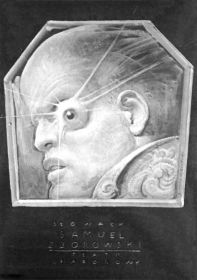
Franciszek Starowieyski 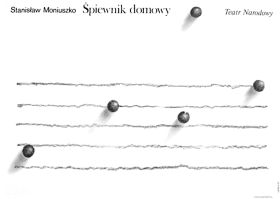 Maciej Urbaniec
Maciej Urbaniec

Henryk Tomaszewski 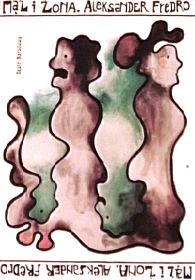
Jan Lenica 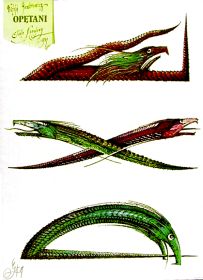
Get Stankiewicz 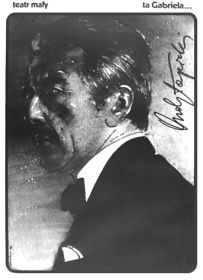
Waldemar Swierzy 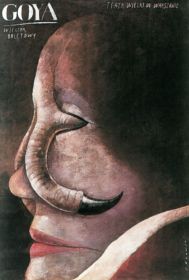
Viktor Sadowski 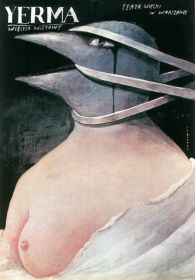
Viktor Sadowski 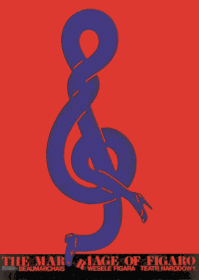
Shigeo Fukuda |
home previous exhibitions page last revised on March 12, 2001 / this section is part of Rene Wanner's Poster Page /